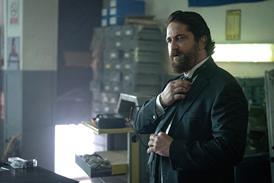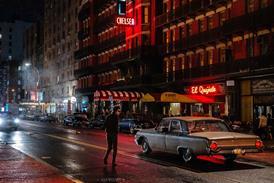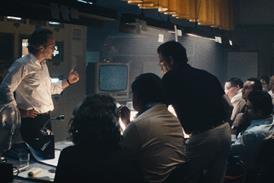Dir: Domingos De Oliveira. Brazil. 2002. 110mins.
A sophisticated, wordy, extremely fast-moving comedy about the loves and lusts of a group of Rio artists and intellectuals (think Woody Allen, with Manhattan angst replaced by an irrepressible Latino hedonism), Breaking Up was a great popular favourite with audiences in Mar Del Plata last week, where it won the Golden Ombu. However its themes are universally familiar, and it could well strike a chord with upscale adult audiences in international urban locations such as Paris, where a brief section is set, New York or London. While the exuberant spirit of Rio De Janeiro itself is an integral part of the film, it would be also an eminently suitable candidate for localised remakes. In Brazil, the film registered 10,850 admissions from eight screens in its first weekend in January.
The story - which the writer-director-star Domingos De Oliviera avows is semi-autobiographical - centres on Cabral, a mercurial, cynical, sixtysomething theatre director and his circle of family and friends. Over dinner in the opening scene, he regales them with the description of a book he has read about people with terminal illnesses who pass through various emotional stages from denial to acceptance. Though Cabral does not realise it at the time, he is about to be pitched onto the same rollercoaster journey.
Deep in a late-life crisis, the five-times married Cabral finds himself once again in a restless mood. Despite the fact that his current union with the much younger Glorinha (sympathetically played by de Oliviera's wife and collaborator Priscilla Rozenbaum) is stable and apparently contented, he announces his urge to experience one last moment of passion. Greatly to his surprise and eventual discomfort, she takes him at his word and proposes a trial separation.
Once granted her freedom, the previously unconfident Glorinha blossoms with a string of lovers while Cabral has a couple of half-hearted May-November flings but almost instantly regrets his decision and sets out with comical single-mindedness to win her back.
Various subplots trace the misadventures of the other characters, most of them also all involved in an ever-changing sexual roundelay. But the piece is dominated by De Oliveira's deliciously self-mocking central performance, which also earned him Mar del Plata's award for Best Actor. By turns charismatic, intolerable and pathetic, he creates a sardonic portrait of male vanity and delusions.
De Oliveira made his debut in Brazil's Cinema Novo in the 1960. Since then he has worked exclusively in television and theatre - this is only his second film in 25 years - and the stage origins of Breaking Up are evident in the highly structured and wordy screenplay. The characters endlessly dissect and reflect on their emotional states, sometimes to maddening effect, and the film threatens to run out of steam in its extended final lope towards a happy ending.
However the director also attacks his material with wit, brio and an ironic touch and a fluid, hand-held camera keeps the action moving along at breakneck speed. Luminous images of Rio and a bouncy music track of Cariocan sounds adds to the overall light-hearted feeling.
Prod cos: Cara de Cao Filmes, Raccord Producoes
Int'l sales: Grupo Novo
Brazilian dist: Riofilme
Prods: Clelia Bessa, Luiz Leitao
Scr: Domingos de Oliveira, with Priscilla Rozenbaum, based on the play by Oliveira
Cinematography: Paulo Violeta
Prod des: Ronald Teixeira
Eds: Natara Ney, Jose Rubens
Main cast: De Oliveira, Rozenbaum, Nannda Rocha, Maria Ribeiro



















No comments yet